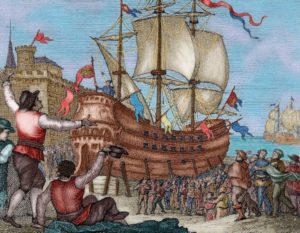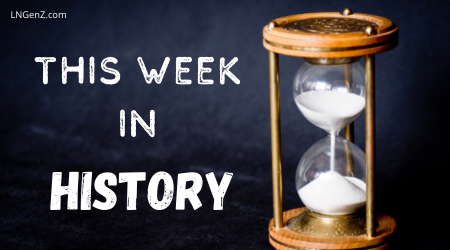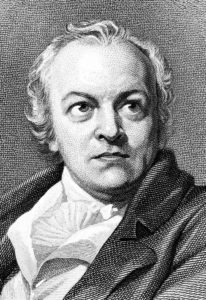-
January
-
February
- This Week in History: February 6-12 – Lesson
- This Week in History: February 6-12 – Quiz
- This Week in History: February 13-19 – Lesson
- This Week in History: February 13-19 – Quiz
- This Week in History: February 20-26 – Lesson
- This Week in History: February 20-26 – Quiz
- This Week in History: February 27-March 5 – Lesson
- This Week in History: February 27-March 5 – Quiz
-
March
- This Week in History: March 6-12 – Lesson
- This Week in History: March 6-12 – Quiz
- This Week in History: March 13-19 – Lesson
- This Week in History: March 13-19 – Quiz
- This Week in History: March 20-26 – Lesson
- This Week in History: March 20-26 – Quiz
- This Week in History: March 27-April 2 – Lesson
- This Week in History: March 27-April 2 – Quiz
-
April
- This Week in History April 3-9 – Lesson
- This Week in History April 3-9 – Quiz
- This Week in History: April 10-16 – Lesson
- This Week in History: April 10-16 – Quiz
- This Week in History: April 17-23 – Lesson
- This Week in History: April 17-23 – Quiz
- This Week in History: April 24-30 – Lesson
- This Week in History: April 24-30 – Quiz
-
May
- This Week in History: May 1 – 7 – Lesson
- This Week in History: May 1 – 7 – Quiz
- This Week in History: May 8 – 14 – Lesson
- This Week in History: May 8 – 14 – Quiz
- This Week in History: May 15 – 21 – Lesson
- This Week in History: May 15 – 21 – Quiz
- This Week in History: May 22-28 – Lesson
- This Week in History: May 22-28 – Quiz
- This Week in History: May 29-June 4 – Lesson
- This Week in History: May 29-June 4 – Quiz
-
June
- This Week in History: June 5 – 11 – Lesson
- This Week in History: June 5 – 11 – Quiz
- This Week in History: June 12-18 – Lesson
- This Week in History: June 12-18 – Quiz
- This Week in History: June 19-25 – Lesson
- This Week in History: June 19-25 – Quiz
- This Week in History: June 26 – July 2 – Lesson
- This Week in History: June 26 – July 2 – Quiz
-
July
- This Week in History: July 3 – 9 – Lesson
- This Week in History: July 3 – 9 – Quiz
- This Week in History: July 10 – 16 – Lesson
- This Week in History: July 10 – 16 – Quiz
- This Week in History July 17 – 23 – Lesson
- This Week in History July 17 – 23 – Quiz
- This Week in History – July 24-30 – Lesson
- This Week in History – July 24-30 – Quiz
- This Week in History: July 31 – August 6 – Lesson
- This Week in History: July 31 – August 6 – Quiz
-
August
- This Week in History: August 7-13 – Lesson
- This Week in History: August 7-13 – Quiz
- This Week in History: August 14 – 20 – Lesson
- This Week in History: August 14 – 20 – Quiz
- This Week in History: August 21 – 27 – Lesson
- This Week in History: August 21 – 27 – Quiz
- This Week in History: August 28 – September 3 – Lesson
- This Week in History: August 28 – September 3 – Quiz
-
September
- This Week in History: September 4 – 10 – Lesson
- This Week in History: September 4 – 10 – Quiz
- This Week in History: September 11 -17 – Lesson
- This Week in History: September 11 -17 – Quiz
- This Week in History: September 18 – 24 – Lesson
- This Week in History: September 18 – 24 – Quiz
- This Week in History: September 25 – October 1 – Lesson
- This Week in History: September 25 – October 1 – Quiz
-
October
- This Week in History: October 2-8 – Lesson
- This Week in History: October 2-8 – Quiz
- This Week in History: October 9 –15 – Lesson
- This Week in History: October 9 –15 – Quiz
- This Week in History: October 16–22 – Lesson
- This Week in History: October 16–22 – Quiz
- This Week in History: October 23–29 – Lesson
- This Week in History: October 23 –29 – Quiz
- This Week in History: October 30 – November 5 – Lesson
- This Week in History: October 30 – November 5 – Quiz
-
November
- This Week in History: November 6 – 12 – Lesson
- This Week in History: November 6 – 12 – Quiz
- This Week in History: November 13 – 19 – Lesson
- This Week in History: November 13 – 19 – Quiz
- This Week in History: November 20 – 26 – Lesson
- This Week in History: November 20 – 26 – Quiz
- This Week in History: November 27- December 3 – Lesson
- This Week in History: November 27- December 3 – Quiz
-
December
This Week in History: November 27- December 3 – Lesson
Ferdinand Magellan further proves the Earth is not flat.
“A library is the delivery room for the birth of ideas, a place where history comes to life.” ~ Norman Cousins
November 28, 1520: Ferdinand Magellan Sails Around the World
Centuries ago, people used to believe that the world was flat and that if you sailed a ship too far, it would fall off the edge. This concept changed somewhat after the New World was discovered in 1492, but in the early 16th century, Portuguese explorer Ferdinand Magellan further dimmed the flat-earth theory when he was able to sail around the world.
Magellan and His Quest for a New Route to the Spice Islands

The ship Victoria sited in Seville, Spain, having been around the world. (Photo by Ipsumpix/Corbis via Getty Images)
Spices, such as cinnamon, nutmeg, and black pepper, were a rare commodity, especially in Europe where the weather was too cold to grow some of the crops. Instead, they had to make dangerous sea voyages to the Spice Islands to obtain these riches. At the time, Europeans were only sailing east, and Magellan was determined to be the first to find a western route to the resource-rich destinations.
He gained an audience with Spain’s King Charles I, the grandson of King Ferdinand and Queen Isabella who had approved and funded Christopher Columbus’ exploration to the New World. Like his grandparents before him, King Charles eagerly agreed to Magellan’s request.
On August 10, 1519, Magellan, with a crew of 270, set off with a number of ships: the Trinidad (Magellan’s ship), the Victoria, the Santiago, and the Conception. It was a long and dangerous trip, with some captains committing mutiny – and one ship even turning around and returning to Spain.
On October 21, 1520, the explorers reached a strait now known as the Strait of Magellan, and it took another month to navigate through the rough and cold water. When they passed through it on November 28, 1520, the water seemed peaceful and calm, and Magellan named it Mar Pacifico, or the Pacific Ocean.
Magellan died before making it to the Spice Islands, but the crew continued the voyage and were successful. Only one ship and 18 men out of the original fleet returned, but the exploration proved that it was possible to sail around the world and that the globe was a much bigger place than ever imagined.
Other Notable History Mentions
November 28, 1821: Panama became independent from Spain and joined the nation of Gran Colombia.
November 28, 1905: Arthur Griffith founded the Irish political party Sinn Fein in Dublin.
November 28, 1919: Lady Nancy Astor became the first female to be elected to the British House of Commons.
November 28, 1943: The Tehran Conference started. President Franklin D. Roosevelt along with Soviet Premier Josef Stalin, and British Prime Minister Winston Churchill were in attendance. They discussed strategies that resulted in the invasion of Normandy, also known as D-Day.
November 29, 1929: Richard Byrd and Bernt Balchen, American explorers, made the first airplane flight to the South Pole.
November 29, 1947: The UN General Assembly partitioned Palestine into Jewish and Arab land. This resulted in the establishment of Israel.
November 29, 1989: After a 12-day revolution, Communist rule ended in Czechoslovakia.
 November 30, 1782: A treaty between Great Britain and America was prepared, ending the American Revolutionary War. It was officially signed on September 3, 1783, and declared the new world “…to be free, sovereign and independent states…” and that the British Crown “… relinquishes all claims to the government, propriety and territorial rights of the same, and every part thereof.”
November 30, 1782: A treaty between Great Britain and America was prepared, ending the American Revolutionary War. It was officially signed on September 3, 1783, and declared the new world “…to be free, sovereign and independent states…” and that the British Crown “… relinquishes all claims to the government, propriety and territorial rights of the same, and every part thereof.”
December 1, 1640: Spanish garrisons were driven out of Portugal during a nationalist revolution, leading to its independence from Spain.
December 1, 1918: The Danish parliament granted Iceland its independence.
December 1, 1925: After World War I, the Locarno Treaties were signed by Belgium, France, and Germany to try to avoid another war.
December 1, 1955: Rosa Parks was arrested in Montgomery, Alabama, because she refused to give up her seat on a bus to a white man. This started a boycott of the bus system by blacks and is widely believed to signify the start of the modern civil rights movement.
December 1, 1988: Benazir Bhutto became the first woman to govern a Muslim nation when she became prime minister of Pakistan.
December 1, 1990: Engineers finished digging a railway tunnel under the English Channel, connecting England to mainland Europe for the first time – at least since the Ice Age.
December 2, 1804: Pope Pius VII in Paris crowned Napoleon Bonaparte Emperor of France.
December 2, 1823: President James Monroe introduced the “Monroe Doctrine” to prevent further colonization by European powers. He said, “We should consider any attempt on their part to extend their system to any portion of this hemisphere as dangerous to our peace and safety.”
December 2, 1942: Physicists led by Enrico Fermi at the University of Chicago successfully accomplished a nuclear chain reaction – the first in the world.
December 2, 1954: Senator Joseph McCarthy was condemned for misconduct by the Senate for his investigations of alleged communists.
December 2, 1971: The United Arab Emirates was formed.
December 2, 1982: Barney C. Clark, 61, received the first permanent artificial heart. Dr. William De Vries performed the operation.
December 3, 1962: Edith Sampson became the first black female judge after being elected in Chicago.
Famous Birthdays

William Blake (Photo by The Print Collector/Print Collector/Getty Images)
Anders Celsius (November 27, 1701) was born in Sweden. He invented the temperature scale for the centigrade (Celsius) which is used in Europe.
Bat Masterson (November 27, 1853) was born in Henryville, Quebec. He was a Wild West lawman, but also a gambler and saloonkeeper. Later, he became a writer.
William Blake (November 28, 1757) was born in London. A well-known poet, some of his most famous works include Songs of Innocence and Songs of Experience. The former is seen through the eyes of children, while the latter looks at adult views of the world.
John Bunyan (November 28, 1628) was born in Elstow, Bedfordshire. A cleric, he wrote A Pilgrim’s Progress which explores the human soul.
Louisa May Alcott (November 29, 1832) was born in Philadelphia, Pennsylvania. She was the author of Little Women.
Nellie Tayloe Ross (November 29, 1876) was born in St. Joseph, Missouri. After her husband, who was governor of Wyoming, died, she finished his term, becoming the country’s first female governor. President Roosevelt named her director of the US Mint in 1933.
Busby Berkeley (November 29, 1895) was born in Los Angeles, California, as William Berkeley Enos. After serving as an entertainment officer in World War I, he started his show business career. Some of his most famous musicals include Forty-Second Street, Strike up the Band, and Gold Diggers of 1933.
C.S. Lewis (November 29, 1898) was born in Belfast, Ireland as Clive Staples Lewis. A Christian author, some of his works include The Pilgrim’s Regress, Miracles, and The Problem of Pain.
Samuel Clemens (November 30, 1835) was born in Florida, Missouri. An author, he used the pen name Mark Twain and wrote such famous books as The Adventures of Tom Sawyer, The Adventures of Huckleberry Finn, and The Prince and the Pauper.
Winston Churchill (November 30, 1874) was born in Blenheim Palace, Oxfordshire, England.
Charles Stuart (December 3, 1755) was born near Narragansett, Rhode Island. A portrait painter, he is well-known for his portraits of James Monroe, James Madison, Thomas Jefferson, and George Washington.